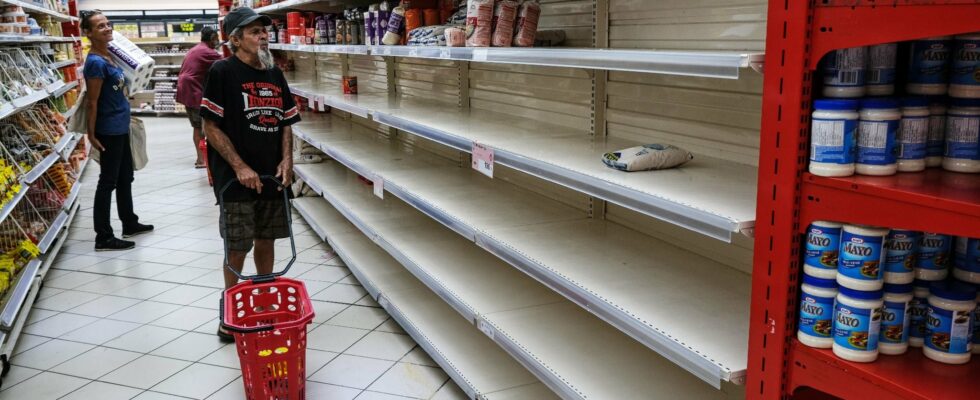80 to 90% of Nouméa’s distribution circuit – namely the capital’s stores, warehouses and wholesalers – would have been “wiped out” during the week, David Guyenne, the president of the Chamber, was alarmed on Thursday May 16 of Commerce and Industry (CCI) of New Caledonia, estimating the losses at several hundred million euros.
While several roads are blocked and many stores have been burned or looted in the riots that have broken out since Monday, local authorities announced several measures on Friday, May 17, to alleviate the difficulties of access to food and care, in particular by freeing up major roads for a “resupply” operation.
No “food shortage” yet
For several days, testimonies from residents of the archipelago have reported difficulties in obtaining basic necessities. “The supermarkets are taken by storm. There are several hours of queues. There are babies who no longer have milk. The essential foodstuffs are no longer there, everything has been robbed”, testified on BFMTV Thomas, the manager of a company in Nouméa. Another resident, still speaking to the television channel, explained that she had waited “an hour in line for two baguettes”.
For now, the government of New Caledonia has estimated in a press release that “there is no food shortage” in the territory, saying it has “identified a sufficient two-month stock”. But the situation could change if “we continue on this destructive path”. “We will have to do an enormous amount of work to restore the functioning of the society of Greater Nouméa, which has been severely impacted by everything that has been looted and destroyed,” warned the state representative in this South Pacific territory on Friday. , Louis Le Franc. The High Commissioner of the Republic has currently retained two “priorities”: food and health.
Reinforcements to free the roads
“There are supply problems that we are going to resolve: a resupply maneuver will be put in place,” he declared to the press. For this, the High Commissioner is counting on the internal security reinforcements who arrived during the night from Thursday to Friday, i.e. nearly a thousand personnel, in addition to the 1,700 on site. They must make it possible to clear the roads “that we need to use so that convoys of food resupply, resupply of medicines, can head towards the structures where it is necessary, towards the commercial areas”. Louis Le Franc added that two boats “with more than a hundred containers which are stuffed with foodstuffs” are stationed off the coast of New Caledonia.
In terms of health, an advanced medical post has also been set up to allow “initial treatment” when necessary, the New Caledonian government announced. Local authorities fear for access to healthcare in the archipelago. “People are already dying, not because of armed conflicts, but because they have no access to care, no access to food,” said the local Minister of Civil Service, Vaimu’a. Muliava. “There are people on dialysis, who should have been on dialysis, who have died,” he said. “Free the roads, let the doctors and nurses go and save people. Let people move,” urged Vaimu’a Muliava. “One more day is one day too many,” he said, believing that the New Caledonian population is “killing each other.”
Difficulties in supplying medicines
The president of the medical commission of the Nouméa hospital, Thierry de Greslan, was also alarmed on Friday by the risk of a “major shortage of medications […] if the situation were to persist”, particularly after the fire in a warehouse where medicines intended for pharmacies in the area were stored.
The situation in New Caledonia is “far from a return to appeasement”, said this Saturday, May 18, Sonia Lagarde, the mayor of Nouméa, in reaction to the death of a sixth person, including two gendarmes in revolts . Since Monday May 13, the archipelago has been the scene of unprecedented riots for 40 years after the uprising of separatists against an electoral reform voted in Paris.
